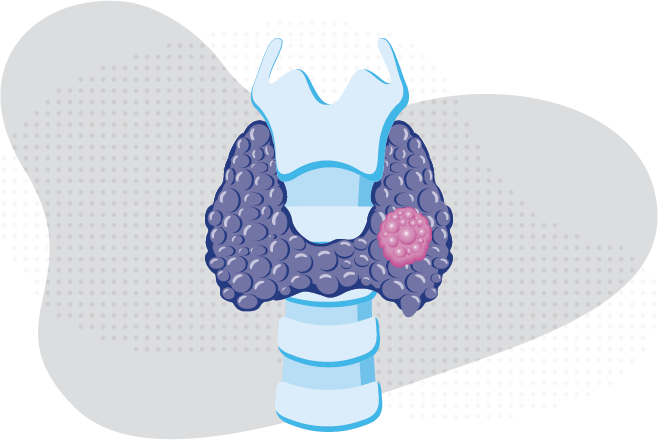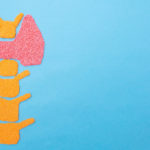Thyroid nodules in children: When to refer

You’re doing a regular well-child check when you think you feel a lump in the front of the neck. Or neck imaging done for some other reason shows a nodule in the thyroid. Could that lump be thyroid cancer? What should your next steps be?
A thyroid nodule is a growth that forms within the thyroid gland, and it may be solid or fluid-filled. The majority of thyroid nodules in children are benign, but careful evaluation is crucial to detect the 20 to 25 percent of thyroid nodules that represent thyroid cancer. “As soon as they hear the word ‘lump,’ the first thing patients and parents worry about is cancer,” says Ari Wassner, MD, medical director of the Thyroid Center at Boston Children’s Hospital. “Fortunately, in most cases we can reassure them that their lump is not dangerous, but identifying the children that do require treatment relies on a team with specific pediatric experience in multiple areas, including endocrinology, radiology, pathology, and surgery.”
If you suspect a nodule
- If you identify or suspect a thyroid nodule, the first step should be to check your patient’s thyroid-stimulating hormone (TSH) level. A low TSH level suggests that you may be dealing with a hyperactive thyroid nodule, which usually is not cancerous.
- Next, imaging is typically in order. Ultrasound is the best way to evaluate thyroid nodules in children and adolescents. Ideally, the ultrasound should be performed by a radiologist with experience in pediatric thyroid ultrasound. Children’s thyroid glands can have ultrasound findings that look different from those in adults, so experience in interpreting ultrasounds in pediatric patients is important.
- If ultrasound confirms that there is a thyroid nodule of significant size (more than 5 mm) or that has suspicious features, you should consider referral to a pediatric endocrinologist or thyroid specialist to determine if a biopsy is needed. Very small thyroid nodules (under 5 mm) that are fluid-filled (cystic) are common and usually do not need any follow-up.
If a biopsy is warranted
- The ultrasound findings will help determine whether a biopsy is necessary, and experience is important in making this decision. If a biopsy is needed, it should be done by ultrasound-guided fine-needle aspiration (FNA), which is safe, simple, and — unlike core-needle or surgical biopsies — can almost always be performed without the need for sedation. The physicians in Boston Children’s Thyroid Center have performed over 1,000 FNAs in children and adolescents. We usually can complete the evaluation of a thyroid nodule — including FNA, if needed — at the first visit, so a patient with a nodule that turns out to require FNA doesn’t have to come back a second time for their procedure.
- When an FNA is performed, a cytopathologist with special expertise in evaluating thyroid nodules should examine the specimen for any signs of possible malignancy. If signs of possible cancer are found, surgery is often needed. Benign nodules usually require only monitoring by ultrasound.
Moving forward
- Although most thyroid nodules in children are benign, the odds of a thyroid nodule being malignant are higher than in adult thyroid nodules. The good news is that thyroid cancer generally grows slowly, giving families — and referring physicians — time to locate a surgeon experienced in pediatric thyroid surgery, or to seek a second opinion.
- At Boston Children’s, our pediatric thyroid surgeons specialize in the care of children and adolescents with thyroid disease, making us one of the most experienced centers of its kind in the country. This breadth and depth of knowledge result in exceptional outcomes and a low rate of surgical complications.
“What parents worry about most when considering surgery for their child is the experience of the surgeon in achieving excellent results and the risk of complications,” says Biren Modi, MD, MPH, surgical director of the Thyroid Center. “By concentrating our large volume of thyroid surgery in just a couple of dedicated surgeons, we have been able to develop expertise in thyroid surgery with outcomes and complications that exceed the benchmarks set forth by endocrine and surgical societies, even for adults. Families and referring physicians can be assured that any thyroid surgery their child needs will be in the hands of a highly experienced surgeon.”
Thyroid exams: Make them part of annual checkups
An important retrospective study by Wassner, Modi, and their colleagues found that only about 40 percent of pediatric thyroid nodules were discovered during clinical exams, while the rest were discovered by patients or their families, or incidentally on imaging. By the time a patient or their family noticed a nodule, it tended to be larger. If it turned out to be thyroid cancer, it was more likely to have spread beyond the thyroid.
For this reason, pediatricians play an essential role in the early detection of thyroid nodules and thyroid cancer. We recommend simple palpation of the thyroid at every well-child visit, as well as at sick visits and whenever a child complains of a lump in the neck, trouble swallowing, or persistent hoarseness. With early identification and prompt evaluation, we can catch thyroid cancers at an earlier stage that requires less invasive treatment and improves kids’ outcomes.
Have questions or ready to refer a patient? Contact the Thyroid Center.
Related Posts :
-

Study: Tool for thyroid nodule evaluation misses thyroid cancers in children
A thyroid nodule is a solid or fluid-filled lump that forms within the thyroid gland. Most thyroid nodules that develop ...
-

Experience matters: For Curtis's family, choosing a thyroid surgeon was simple
For many parents, being told their child needs a total thyroidectomy — surgical removal of the entire thyroid gland — comes ...
-

Which genetic syndromes can increase a child’s risk of cancer?
Inherited cancers account for at least 5 to 10 percent of all pediatric cancers. The same advances in technology that have enabled ...
-

From Alabama for answers: Adella's thyroid journey
She may only be 12 years old, but Adella Jackson has already expanded her family’s perspective. “She’s broadened our ...





